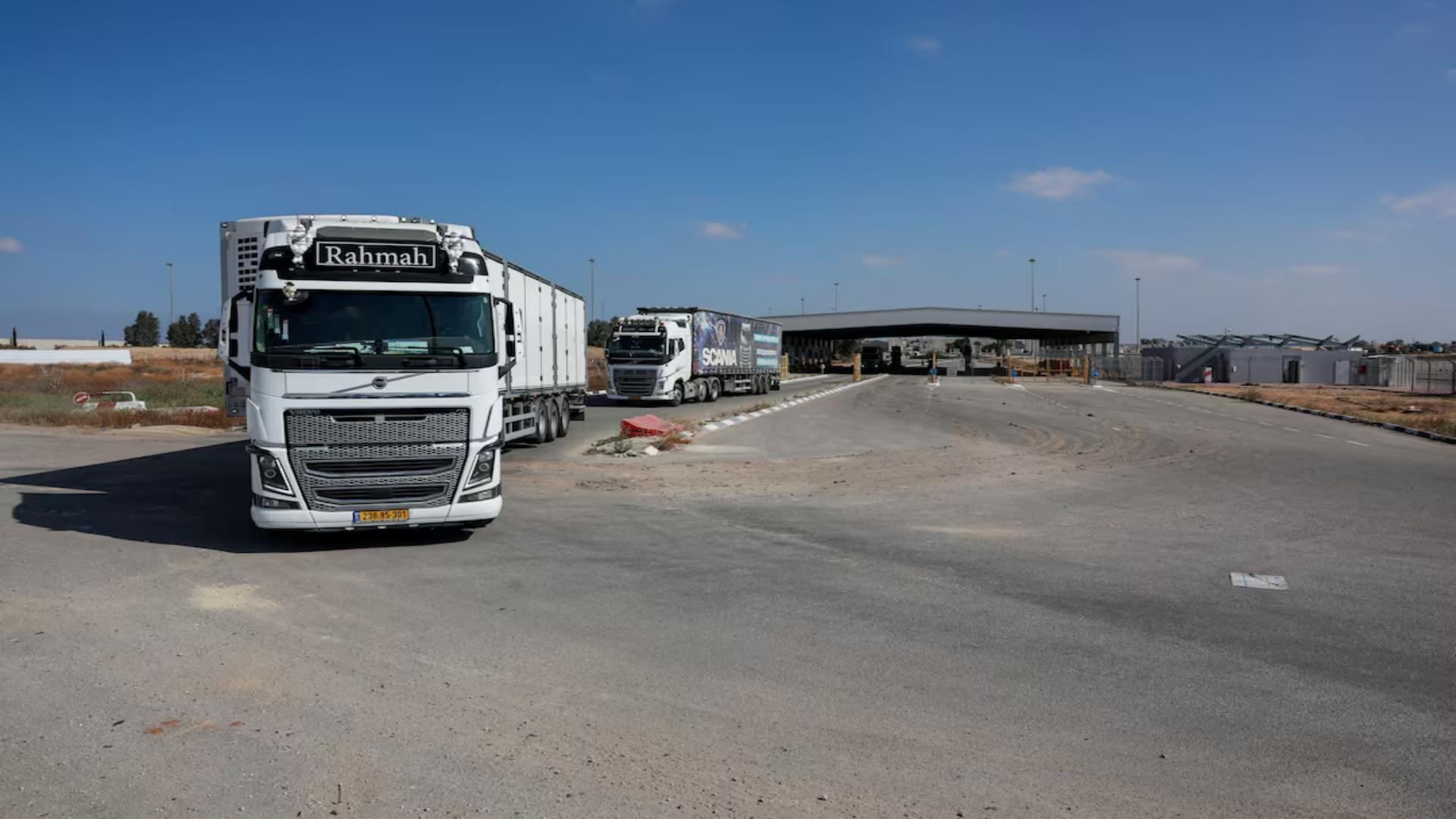Reuters
Flour and other aid started reaching some of Gaza's most vulnerable areas on Thursday after Israel let some trucks through, but nowhere near enough to make up for shortages caused by an 11-week blockade, Palestinian officials said.
Many other trucks were still at the border, and people were still waiting to receive food, amid fears that desperate crowds would try to loot the vehicles when they arrived, the Palestinian Red Crescent warned.
Israel said it allowed 100 trucks carrying baby food and medical equipment into the enclave on Wednesday, two days after announcing its first relaxation of the restrictions under mounting international pressure.
"Flour arrived from the (U.N.) World Food Programme, and we immediately started working," baker Ahmed Al-Banna said as flatbreads passed by on a conveyor belt behind him at his base in Deir al-Balah on Thursday.
Bakeries across the south of the enclave started ovens that had been shut for two months, he added. "God willing, bakeries in northern Gaza will soon resume work."
Israel imposed the blockade on all supplies in March, saying Hamas was seizing deliveries for its fighters - a charge the group denies. The UN has said a quarter of Gaza's 2.3 million people are at risk of famine.
The Palestinian health minister said 29 children and elderly people had died from starvation-related reasons in Gaza in recent days and that many thousands more were at risk.
Israel has repeatedly defended its controls on aid in Gaza, saying reports from aid groups of famine-like conditions were exaggerated and denying accusations of causing starvation.
Bread distribution would start later on Thursday, Amjad al-Shawa, director of the Palestinian Non-Governmental Organizations Network in Gaza, told Reuters.
He said just 90 trucks had got through. "During the ceasefire, 600 trucks used to enter every day, which means that the current quantity is a drop in the ocean, nothing," he said.
Bakeries backed by the WFP would produce the bread and the agency's staff would hand it out - a more controlled system than previously when bakers sold it directly to the public at a low cost, he added.
Palestinian Red Crescent president Younis Al-Khatib said many trucks were still at the border at Karem Shalom and there was a risk of violence and looting when they arrived.
"No civilian has received anything yet," he said. "It's very hard to hide the rush or the looting that will happen."
On Wednesday night, boys and young men gathered after one vehicle arrived in the southern Gazan city of Khan Younis, but kept back as men, some holding guns, watched over the unloading of sacks.
The International Committee of the Red Cross said it had got one truck of medical supplies through to replenish its field hospital in Rafah, but more was needed.
"A trickle of trucks is woefully inadequate. Only the rapid, unimpeded, and sustained flow of aid can begin to address the full scope of needs on the ground," the organisation added in a statement.
Many other trucks were still at the border, and people were still waiting to receive food, amid fears that desperate crowds would try to loot the vehicles when they arrived, the Palestinian Red Crescent warned.
Israel said it allowed 100 trucks carrying baby food and medical equipment into the enclave on Wednesday, two days after announcing its first relaxation of the restrictions under mounting international pressure.
"Flour arrived from the (U.N.) World Food Programme, and we immediately started working," baker Ahmed Al-Banna said as flatbreads passed by on a conveyor belt behind him at his base in Deir al-Balah on Thursday.
Bakeries across the south of the enclave started ovens that had been shut for two months, he added. "God willing, bakeries in northern Gaza will soon resume work."
Israel imposed the blockade on all supplies in March, saying Hamas was seizing deliveries for its fighters - a charge the group denies. The UN has said a quarter of Gaza's 2.3 million people are at risk of famine.
The Palestinian health minister said 29 children and elderly people had died from starvation-related reasons in Gaza in recent days and that many thousands more were at risk.
Israel has repeatedly defended its controls on aid in Gaza, saying reports from aid groups of famine-like conditions were exaggerated and denying accusations of causing starvation.
Bread distribution would start later on Thursday, Amjad al-Shawa, director of the Palestinian Non-Governmental Organizations Network in Gaza, told Reuters.
He said just 90 trucks had got through. "During the ceasefire, 600 trucks used to enter every day, which means that the current quantity is a drop in the ocean, nothing," he said.
Bakeries backed by the WFP would produce the bread and the agency's staff would hand it out - a more controlled system than previously when bakers sold it directly to the public at a low cost, he added.
Palestinian Red Crescent president Younis Al-Khatib said many trucks were still at the border at Karem Shalom and there was a risk of violence and looting when they arrived.
"No civilian has received anything yet," he said. "It's very hard to hide the rush or the looting that will happen."
On Wednesday night, boys and young men gathered after one vehicle arrived in the southern Gazan city of Khan Younis, but kept back as men, some holding guns, watched over the unloading of sacks.
The International Committee of the Red Cross said it had got one truck of medical supplies through to replenish its field hospital in Rafah, but more was needed.
"A trickle of trucks is woefully inadequate. Only the rapid, unimpeded, and sustained flow of aid can begin to address the full scope of needs on the ground," the organisation added in a statement.









